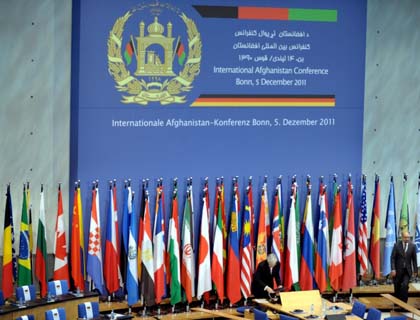The Bonn Conference on Afghanistan hosted on December 5th raised the aspirations of the 1100 participants towards reaching peaceful settlement of the problems facing Afghanistan and the region, described as a conference for peace rather than a peace conference by Ambassador Michael Steiner, Germany's special Representative for Afghanistan and Pakistan, the exercise did achieve a few steps in this direction.
I was invited to attend the conference by the German Foreign Ministry and departed Islamabad before the Government of Pakistan decided to boycott the event as a protest for the NATO and ISAF forces murdering 24 Pakistani soldiers at a check-post well inside Pakistani territory.
Since I had reached Germany, I decided to make the best of the trip to present Pakistan's viewpoint to the German and International media. We first visited Berlin, where we held discussions with members of the German Parliament, the Bundestag regarding the Bonn Conference.
Our media group comprised four Afghans, three Pakistanis and one Iranian and Kazakhstani journalists. Our hosts were keen to know what the real reason for Pakistan's boycott was. We made it absolutely clear that Pakistan had no hidden agenda and its anger, angst and hurt feelings must be respected.
After all, as retaliation to the arson at the British Embassy in Tehran, UK closed down its diplomatic mission, withdrew its diplomats and expelled the Iranian diplomats from London. Simultaneously, European Union expressed its condemnation of the attack on the British Embassy.
No loss of life occurred in the Tehran attack; it cannot be condoned but the accident is unfairly chastising Pakistan for reacting to the perhaps premeditated massacre of its soldiers while itself retaliating to the Tehran event.
The Bonn Conference was preceded by a number of events. One of them was a two day' seminar organized for the Civil Society of Afghanistan by various German political NGOs. Thirty-four participants of Afghan Civil Society Forum, German politicians, philanthropists and media attended the event at the Beethoven Halle. It was ironic that the Civil Society Forum took pains to highlight the problems plaguing Afghan society, but it spoke in general and vague terms only, failing to identify possible solutions.
On the eve of the conference, UN Secretary General Ban Ki Moon desired to meet our group of journalists from Afghanistan, Iran and Pakistan exclusively. We queried the UN Secretary General, if he has asked for an investigation into the attack on the Pakistani military check-post by NATO since it was a violation of the UN mandate. He chose to ignore the question.
The conference itself commenced with short speeches by the German and Afghan Foreign Ministers and Mr. Karzai and Angela Merkel, the German Chancellor. Each delegate presented a three minute short speeches to express his/her view point. The Chinese Foreign Minister opined that regional organizations like SCO should be engaged to help Afghanistan. Iran made it clear that it deemed it undesirable that some foreign powers wanted to extend their military presence beyond 2014.
The German identification with the Afghans is understandable that Germany itself was humiliated by the allies following the First World War, defeated, occupied and divided after the Second World War and so is the case with Afghanistan. Thus the efforts of the Germans to help rebuild Afghanistan are both noble and based on emotive norms.
Following the Bonn Conference, we were invited to visit the NATO Headquarters at Brussels to cover the NATO Foreign Ministers' Conference on Afghanistan. This was a follow up action since our hosts, the German Ministry of Foreign Affairs was keen that we get acquainted with the working of NATO and the Foreign Ministers' meet on Afghanistan.
I entered the NATO Headquarters with mixed feelings, since on the one hand there was angst at the NATO attack on the Pakistani military check-post taking a toll of 24 lives from the Pakistan military; simultaneously I thought it was a good opportunity to put across Pakistan's viewpoint to NATO.
On arrival at Brussels, we directly went to the NATO Headquarters, where we were provided a pre-ministerial briefing by OanaLungescu, the NATO Spokesperson and Ambassador Dirk Brengelmann, NATO Assistant Secretary General for Political Affairs and Security Policy.
Both were candid in responding to our questions. We asked that apart from the customary condolence expressed by US Secretary of State and NATO Commanding General, why NATO had not rendered a formal apology for the grave incident of unprovoked NATO air strikes against the Pakistani border outpost.
NATO's response was that since the matter was still being investigated, it would be too early to attribute blame on any agency, hence actions of apology and compensation if merited, would be taken once the findings of the investigation are complete. On querying regarding the effects of decision of Pakistan's Defense Committee of the Cabinet to block NATO supplies into Afghanistan, NATO replied that it would have a telling effect on the operations in Afghanistan.
The next morning, we had separate briefings with the NATO Spokesperson, Mr. Nick Williams of the Operations Division of the Afghanistan Section of NATO, Brigadier General Josef Blotz, of the German Delegation to NATO and spokesperson of International Security Forces (ISAF) from April 2010-July 2011 and Mr. Gille Vander Ghinst, representative of Political Affairs and Security Policy Division.
The next morning, after a meeting of the Foreign Ministers of ISAF to discuss Afghanistan and plans to gradually transfer security control to Afghan forces before foreign combat troops plan to withdraw by the end of 2014, NATO Secretary General Anders Fogh Rasmussen and US Secretary of State Hillary Clinton jointly unveiled the logo for the NATO conference in Chicago May 2012. Hillary Clinton found it opportune to condemn the attack by Lashkar-e-Jhangwi on Shiite mourners in Kabul and warned Pakistan to reign in the terrorists.
The visit not only enabled us to understand the international resolve to continue its support for Afghanistan but also brought greater understanding with our Afghan counterparts and will help in shedding mutual distrust and build camaraderie.

